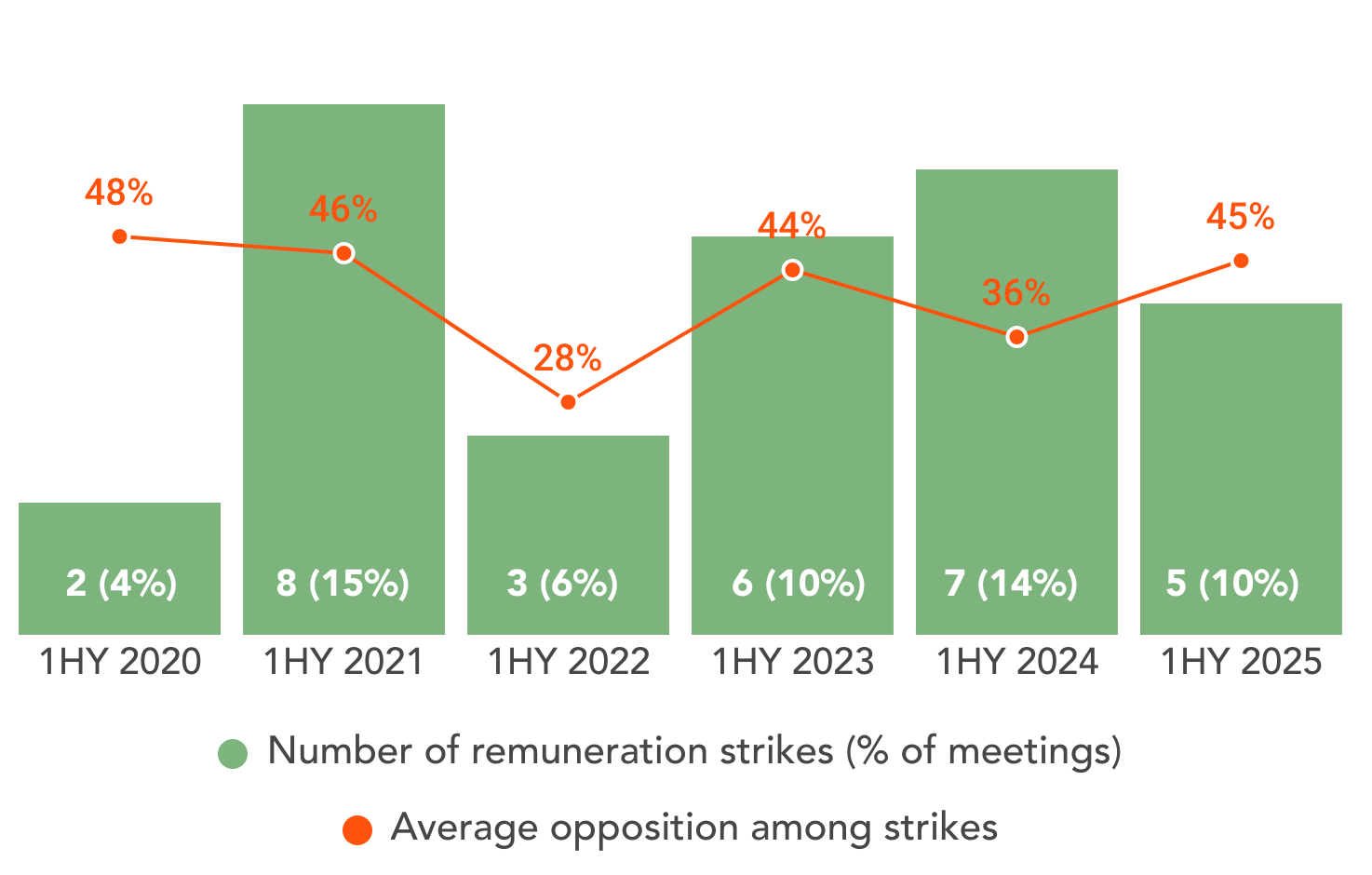
Lines of Sight: What Investors Can Learn From Early Trends on Executive Compensation in Australia
SubscribeKey Takeaways
- While there were fewer remuneration strikes at Australian AGMs for the first half of 2025 compared to the previous year, shareholder scrutiny remains high and so does the willingness to vote against.
- Five remuneration strikes were recorded, representing 10% of S&P/ASX 300 AGMs held during the period, which is a decrease from the same period in 2024.
- Three of the five strikes recorded during the half – and the three most severe – were at companies where a founder still sets the tone.
- Founder-led boards tend to be more resistant to shareholder pressure and are typically slower to make substantial changes in response to feedback.
- This has led investors to become more alert, and more willing to signal dissatisfaction through a vote against the remuneration report.
The year 2024 saw continued, elevated levels of shareholder dissent in Australia, particularly around remuneration. As the Australian market heads into the 2025 proxy season, we expect investors to maintain a similar degree of scrutiny. This article considers what may lie ahead for executive compensation, covering the opposition votes seen at the AGMs held in the first half of the year and the trends that we expect to continue into Austrailia's main AGM season.
Remuneration Strikes and Shareholder Opposition Votes
During the half-year period from this year, a total of 52 S&P/ASX 300 companies held their AGM. During this period, five remuneration strikes were recorded,1 representing 10% of S&P/ASX 300 AGMs held during the period – a decrease from the same period in 2024. However, the severity of dissent was higher, with an average vote of 45% against (Figure 1).
Figure 1. ASX300 Remuneration Strikes, First Half 2020-2025

Source: Glass Lewis Research
Similar to the first half of 2024, two companies received repeated strikes. In addition, one company avoided a strike, but still recorded over 20% dissent: DroneShield Limited, with 21.5% votes against the remuneration report. Another company, Life360 Inc, saw 23.7% opposition to its remuneration proposal. However, as a U.S.-based entity listed on the ASX, Life360 falls outside the jurisdiction of the Corporations Act 20012 and is therefore exempt from the two-strikes rule. Accordingly, even if dissent exceeded 25%, the two-strikes rule would not apply.
Looking at Remuneration Strikes by Company
Dicker Data recorded its fifth consecutive strike. In an effort to address shareholder concerns, the board introduced a long-term incentive scheme to replace the previously uncapped superannuation contribution. However, executive pay remains largely underpinned by uncapped profit-share cash bonuses; a structure that continues to be highly costly to shareholders, with three executive directors entitled to receive 8% of company profits. Dissent against the remuneration report has been steadily increasing, reaching a striking 76.6% at the 2025 AGM, indicating that shareholders have not found the board’s response adequate (at the 2024 AGM, 42% voted against and in 2023, 26.4% voted against).
The company remains founder-led, with the two co-founders holding a near-majority stake and continuing to occupy key leadership roles. David Dicker recently stepped down as CEO and director, with fellow co-founder Fiona Brown moving into an executive chair role. While the co-founders and other executives are excluded from voting on the remuneration report, they are not restricted from voting on other items, such as director elections. This dynamic limits the ability of minority shareholders to translate protest votes into majority outcomes on other resolutions.
Brainchip Holdings recorded its third consecutive remuneration strike, with shareholders signalling continued dissatisfaction over stalled commercial progress and share price. The CEO’s equity grant proposal narrowly avoided rejection, receiving just 49.6% support – likely reflecting concerns around limited transparency and a weak link to performance.
The remuneration strike at West African Resources was likely triggered by significant increases in executive fixed remuneration flagged for FY2025. The company also recorded a fatality at its operations during the year. While investigations indicated that the incident involved contractors acting without appropriate permissions, the board opted to reduce FY2024 short-term incentive vesting from 100% to 95% in response. However, some investors may view this reduction as insufficient given the seriousness of the incident.
Select Harvests encountered operational issues following a change in logistics provider, contributing to negative TSR over the financial year. In response, the board reduced the total short-term incentive payment by 30% to reflect the adverse impact. However, some shareholders may have viewed this reduction as insufficient given the financial consequences.
In March 2025, Helia Group shareholders suffered a sharp loss in value after one of the company’s largest clients, CBA, entered exclusive talks with a rival LMI provider. The situation was further exacerbated by the timing of executive share sales shortly before the announcement – including a A$2.6 million selldown by the CEO. While the chair stated there was “no indication of any breach”, the episode raised concerns about governance controls and board oversight. Some investors appear to have expressed their dissatisfaction through votes against the remuneration report, the CEO’s equity grant, and the election of directors. Following the meeting, the CEO stepped down after five years in the role.
Table 1. Summary of S&P/ASX 300 Remuneration Report Opposition Votes in the First Half of 2025
Source: Glass Lewis Research
Note: Opposition votes noted are those with more than 25% against.
Potential Lessons: Founder-Led Boards Drawing Increased Scrutiny and Their Resistance to Feedback
While there were fewer remuneration strikes in the first half of 2025 compared to the previous year, shareholder scrutiny remains high and so does the willingness to vote against. Persistent “serial-strike” stories now dominate the landscape. Dicker Data and BrainChip recorded their fifth and third consecutive strikes, respectively, and also received the two highest protest votes of the period. This is clear evidence that incremental tweaks or poorly targeted changes are not enough to satisfy shareholders following a protest vote.
Notably, both companies have founders in influential board roles. The company with the third-highest level of dissent, West African Resources, also has a founder at the helm, serving as both executive chair and CEO. Taken together, three of the five strikes recorded during the half – and the three most severe – were at companies where a founder still sets the tone.
There are two possible lessons here. First, it may reflect growing scrutiny of founder-led boards following recent controversies at Mineral Resources and WiseTech Global. What has often been described in the media as a “founder problem” may have prompted some investors to become more alert, and more willing to signal dissatisfaction through a vote against the remuneration report.
Second, founder-led boards tend to be more resistant to shareholder pressure and are typically slower to make substantial changes in response to feedback. While investors may have been more understanding of this dynamic in the past, the magnitude of dissent seen this year suggests that patience may be wearing thin.
Separately, executive shareholdings are drawing greater scrutiny. Significant share sales by executives shortly before major adverse events can raise investor concerns about transparency and governance judgment, even in the absence of any formal breach. The resulting protest votes suggest shareholders are paying closer attention to how executives manage their personal exposure to company performance and are increasingly willing to respond when actions appear misaligned with shareholder interests.
For more insights into the upcoming Australia and New Zealand 2025 proxy season, watch our on-demand webinar here.
Notes and References
- A remuneration strike, or more commonly 'strike,' refers to a mechanism where a significant portion (more than 25%) of shareholders of a publicly listed company vote against a remuneration report proposal. Under Australia's "two strikes" rule, if shareholders record strikes in two consecutive years, it can trigger a ‘spill resolution’, where shareholders vote on whether to remove the directors.
- Federal Register of Legislation. Corporations Act 2001. Australian Government. Accessed Sept. 1, 2025. https://www.legislation.gov.au/C2004A00818/2019-07-01/text




.png)


